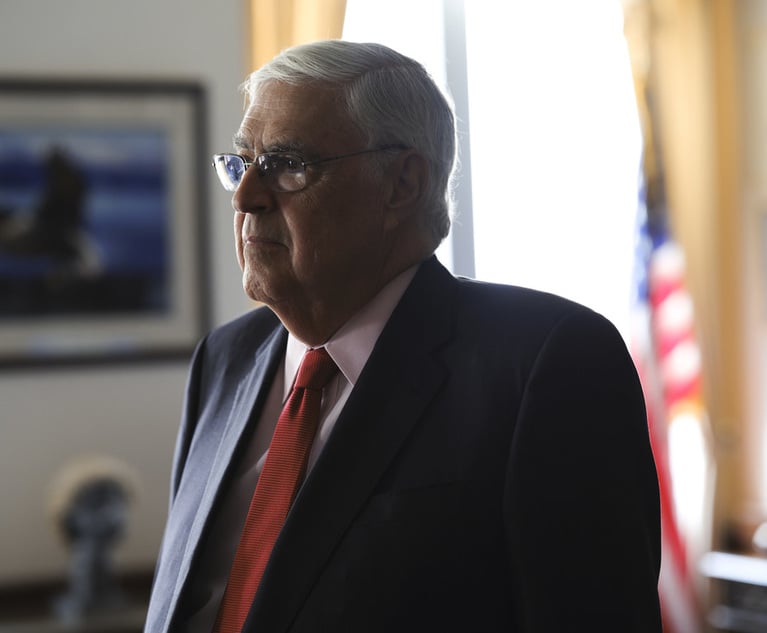 U.S. District Chief Judge Phyllis Hamilton, Northern District of California (Photo: Jason Doiy/ALM)
U.S. District Chief Judge Phyllis Hamilton, Northern District of California (Photo: Jason Doiy/ALM)Fate of XRP Cryptocurrency Market Now in Judge's Hands
If the class action against Ripple Labs proceeds, it would not only threaten to eliminate XRP's utility as a currency, but it would upend and threaten to destroy "the $500 billion XRP market," according to the financial tech company's motion to dismiss.
January 15, 2020 at 05:59 PM
5 minute read
The original version of this story was published on The Recorder
A federal judge's interpretation of the hazy definitions of securities and public offerings in the cryptocurrency world could determine whether an investor class action proceeds against financial tech company Ripple Labs.
On Wednesday, Chief District Judge Phyllis Hamilton of the Northern District of California heard Ripple Lab's case for dismissing a class action claiming the San Francisco company deceived investors of its XRP cryptocurrency. If the case proceeds, "it would not only threaten to eliminate XRP's utility as a currency, but it would upend and threaten to destroy" the market, which has seen $500 billion in trading in the last two years, according to the motion.
Lead plaintiff Bradley Sostack alleges he bought nearly 128,979 XRP in January 2018 for approximately $307,700 in bitcoin and USDT, a cryptocurrency issued by Tether. He sold his XRP for a loss of $118,100 the following week, according to the consolidated complaint filed in August. Sostack represents a class of XRP investors who allege Ripple Labs misled them into purchasing an unregistered security.
Ripple Labs' Boies Schiller Flexner and Debevoise & Plimpton attorneys argued the complaint exceeds the three-year deadline for filing a suit outlined in the Securities Act's statute of repose. Since the investors claim all XRP units were created in 2013 and brought to the general public before May 2015, Ripple contends the complaint is untimely.
Sostack's counsel from Susman Godfrey in Los Angeles and Taylor-Copeland Law in San Diego argued that Ripple Labs' attempt to invoke the statute of repose "is a twisted application" of the time limit that would undermine the law's purpose of protecting investors from fraud, according to the opposition to the motion to dismiss.
"There's always going to be tension between the remedial function of the law and the statute of repose," said Boies Schiller's Damien Marshall, of the firm's New York office, in response to the complaint. "That's the nature of repose, it is a limitation on continuing liability. That is the congressional intent."
Susman Godfrey's Oleg Elkhunovich said that, like many of the defendant's other arguments, the statute of repose raises issues that cannot be decided at the motion-to-dismiss stage. Elkhunovich, whose is based in Los Angeles, said the statute's application leads to a question of fact over whether Ripple Labs issued a genuine, bona fide public offering before 2017, and if it's had multiple offerings that would reset that start date of repose.
"An offering to the public is not enough. It has to be the type of bona fide public offering that would put the public on notice," he said.
Elkhunovich said the complaint did not point to any facts, nor did Ripple Labs make any arguments, about when the first public offering was made. Although, he did point to an error in the filing that said a $700,000 settlement Ripple Labs made in 2015 with the federal government for selling XRP without authorization acknowledged that the company did offer the currency to the "general public."
"You're suggesting that I rely on what you say instead of what you pled because it's inaccurate?" Hamilton asked. "Given how careful you're being about the characterization of sales to the public, it's the essence of your argument, why did you include that in your complaint?"
"In that respect, that's a mistake," he said.
Turning to Marshall, she asked if Ripple Labs was running with the argument that "the few times public offering is used in the complaint" is enough to show a public offering was made.
"It's plaintiffs' burden to show that repose doesn't apply in pleadings," he said. They have to be held to allegations in the complaint that there were public sales and billions in circulation by 2015, he said. "All those facts meet the definition of a genuine offer to the public," he said.
Besides the factual dispute over a public offering, plaintiffs argue that XRP is an unregistered security, while Ripple Labs has defined the virtual currency as a commodity, similar to bitcoin and Ethereum, in the past. Yet, when it comes to plaintiffs' claims under California's Unfair Competition Law and False Advertising Law, the company said those laws cannot be applied to securities transactions under the Bowen doctrine.
"Counsel admitted to classifying as a security for the purposes of this motion, only for purposes of this motion, they are not arguing XRP is not a security," Elkhunovich said. "Believe it, if this case proceeds that will be one of the key issues that will be hotly disputed."
Meanwhile, on Monday, the chairman of the Commodity Futures Trading Commission, Heath Tarbert, told news site Cheddar the status of XRP as a security or commodity is still unclear. "We've been working closely with the SEC over the last year or so to really think about which falls in what box, because I think if I hear anything from market participants, it's that we really need clarity," he said.
This content has been archived. It is available through our partners, LexisNexis® and Bloomberg Law.
To view this content, please continue to their sites.
Not a Lexis Subscriber?
Subscribe Now
Not a Bloomberg Law Subscriber?
Subscribe Now
NOT FOR REPRINT
© 2024 ALM Global, LLC, All Rights Reserved. Request academic re-use from www.copyright.com. All other uses, submit a request to [email protected]. For more information visit Asset & Logo Licensing.
You Might Like
View All
Stock Trading App Robinhood Hit With Privacy Class Action 1 Month After Alleged Data Breach

Congress and Courts Are Considering Litigation Financing: Is Disclosure Imminent?
8 minute read
Auditor Finds 'Significant Deficiency' in FTC Accounting to Tune of $7M
4 minute read
'A World of Credit': Ex-FTX Executive Gary Wang Sentenced to Time Served Following Cooperation
Law Firms Mentioned
Trending Stories
- 1Judge Denies Sean Combs Third Bail Bid, Citing Community Safety
- 2Republican FTC Commissioner: 'The Time for Rulemaking by the Biden-Harris FTC Is Over'
- 3NY Appellate Panel Cites Student's Disciplinary History While Sending Negligence Claim Against School District to Trial
- 4A Meta DIG and Its Nvidia Implications
- 5Deception or Coercion? California Supreme Court Grants Review in Jailhouse Confession Case
Who Got The Work
Michael G. Bongiorno, Andrew Scott Dulberg and Elizabeth E. Driscoll from Wilmer Cutler Pickering Hale and Dorr have stepped in to represent Symbotic Inc., an A.I.-enabled technology platform that focuses on increasing supply chain efficiency, and other defendants in a pending shareholder derivative lawsuit. The case, filed Oct. 2 in Massachusetts District Court by the Brown Law Firm on behalf of Stephen Austen, accuses certain officers and directors of misleading investors in regard to Symbotic's potential for margin growth by failing to disclose that the company was not equipped to timely deploy its systems or manage expenses through project delays. The case, assigned to U.S. District Judge Nathaniel M. Gorton, is 1:24-cv-12522, Austen v. Cohen et al.
Who Got The Work
Edmund Polubinski and Marie Killmond of Davis Polk & Wardwell have entered appearances for data platform software development company MongoDB and other defendants in a pending shareholder derivative lawsuit. The action, filed Oct. 7 in New York Southern District Court by the Brown Law Firm, accuses the company's directors and/or officers of falsely expressing confidence in the company’s restructuring of its sales incentive plan and downplaying the severity of decreases in its upfront commitments. The case is 1:24-cv-07594, Roy v. Ittycheria et al.
Who Got The Work
Amy O. Bruchs and Kurt F. Ellison of Michael Best & Friedrich have entered appearances for Epic Systems Corp. in a pending employment discrimination lawsuit. The suit was filed Sept. 7 in Wisconsin Western District Court by Levine Eisberner LLC and Siri & Glimstad on behalf of a project manager who claims that he was wrongfully terminated after applying for a religious exemption to the defendant's COVID-19 vaccine mandate. The case, assigned to U.S. Magistrate Judge Anita Marie Boor, is 3:24-cv-00630, Secker, Nathan v. Epic Systems Corporation.
Who Got The Work
David X. Sullivan, Thomas J. Finn and Gregory A. Hall from McCarter & English have entered appearances for Sunrun Installation Services in a pending civil rights lawsuit. The complaint was filed Sept. 4 in Connecticut District Court by attorney Robert M. Berke on behalf of former employee George Edward Steins, who was arrested and charged with employing an unregistered home improvement salesperson. The complaint alleges that had Sunrun informed the Connecticut Department of Consumer Protection that the plaintiff's employment had ended in 2017 and that he no longer held Sunrun's home improvement contractor license, he would not have been hit with charges, which were dismissed in May 2024. The case, assigned to U.S. District Judge Jeffrey A. Meyer, is 3:24-cv-01423, Steins v. Sunrun, Inc. et al.
Who Got The Work
Greenberg Traurig shareholder Joshua L. Raskin has entered an appearance for boohoo.com UK Ltd. in a pending patent infringement lawsuit. The suit, filed Sept. 3 in Texas Eastern District Court by Rozier Hardt McDonough on behalf of Alto Dynamics, asserts five patents related to an online shopping platform. The case, assigned to U.S. District Judge Rodney Gilstrap, is 2:24-cv-00719, Alto Dynamics, LLC v. boohoo.com UK Limited.
Featured Firms
Law Offices of Gary Martin Hays & Associates, P.C.
(470) 294-1674
Law Offices of Mark E. Salomone
(857) 444-6468
Smith & Hassler
(713) 739-1250








